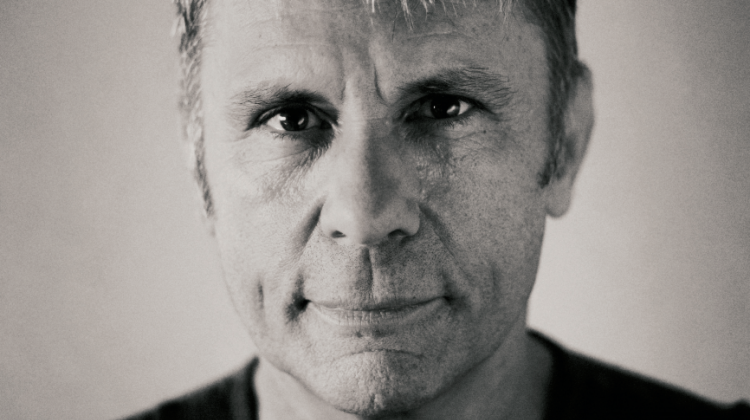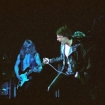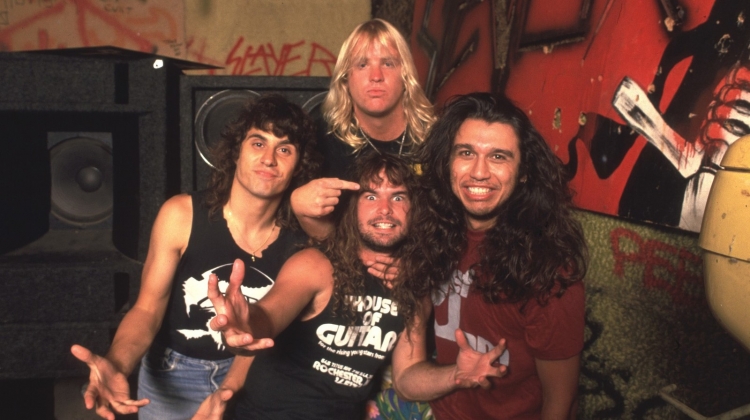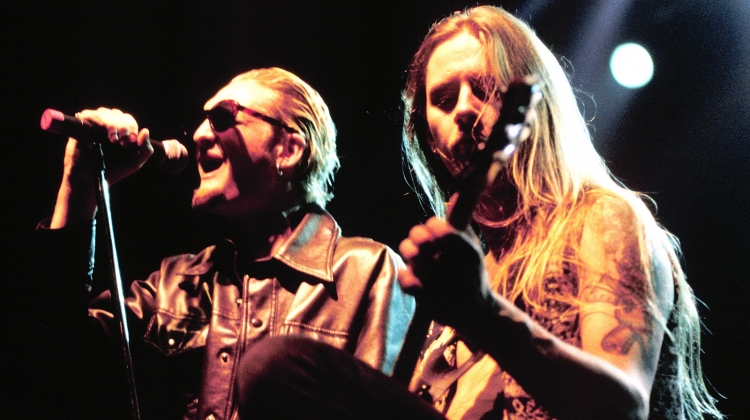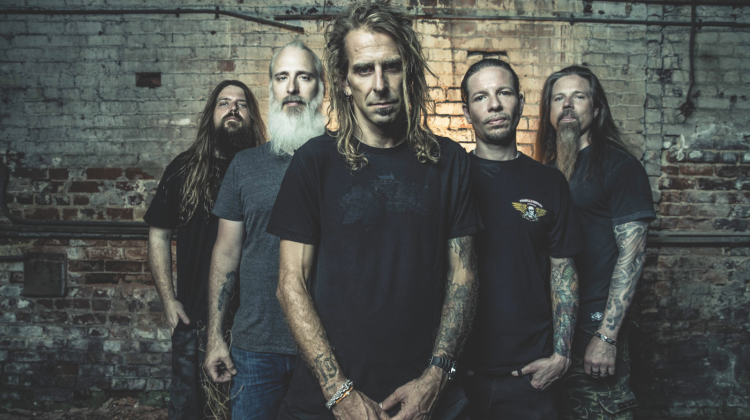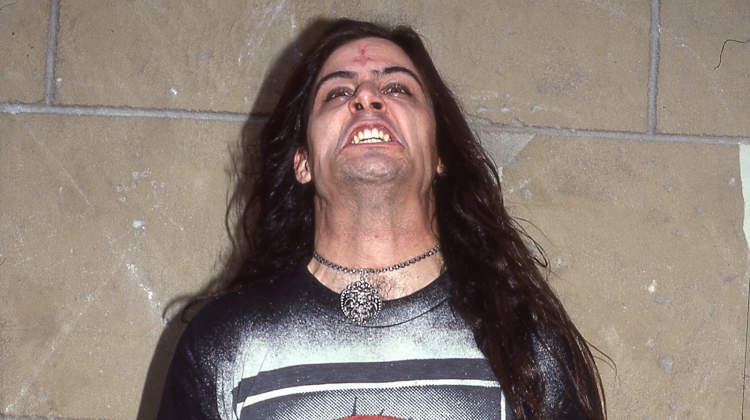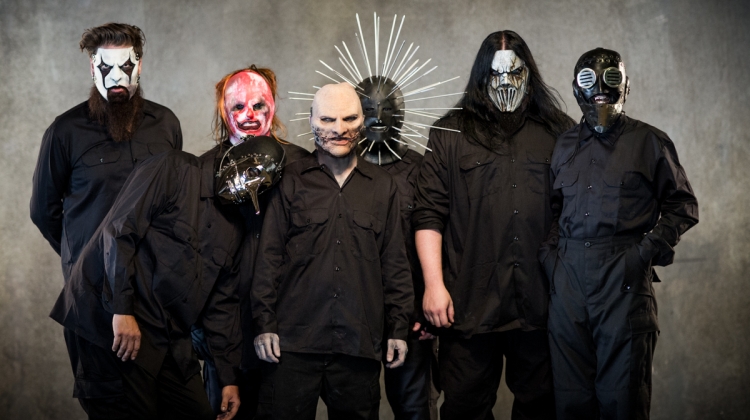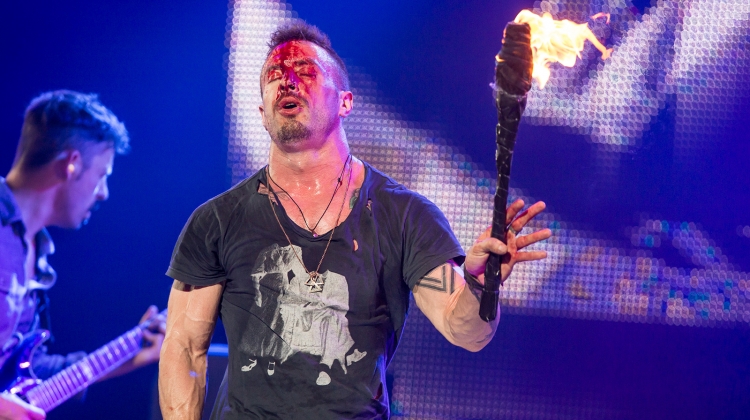According to Bruce Dickinson, only three or four other journalists in the world possess copies of his new memoir when he speaks to Revolver on Labor Day. In fact, he says his own bandmates in Iron Maiden have yet to read it. The book is so top secret at this point that we had to agree both verbally and via email that we wouldn't show our copy — which isn't even the final version — to anyone else. Then we had to sign a legally binding non-disclosure agreement. If that sounds like a lot of red tape just to read the life story of one of heavy metal's most revered singers, well ... it was worth it. Surprisingly funny and penned without the help of a co-writer — longhand, no less — What Does This Button Do? follows Dickinson's rise from anonymous grade-school troublemaker in Worksop, England, to world-class fencer, commercial airline pilot, beer magnate and — oh, right — frontman of one of the world's greatest metal bands.
"There was an awful lot of stuff stacking up," he says while reflecting on his experiences — to which he can add launching a second signature Maiden beer, "Hallowed," and a new vinyl box set, Soloworks, of his solo music. "My original manuscript was something like 170,000 words, but we chopped it back to 105,000. I could've probably done another 60 or 70,000 on top of that comfortably had we included all kinds of other stuff in there. But it would've been a pretty unreadable book."
WHY DID YOU DECIDE TO WRITE A MEMOIR? YOU DON'T USUALLY TALK ABOUT YOUR PERSONAL LIFE IN INTERVIEWS, AND NOW YOU'RE SUDDENLY DIVULGING ALL THESE PERSONAL DETAILS IN ONE GO.
BRUCE DICKINSON It's interesting that you say that, because there're a lot of personal details that I deliberately didn't go into because I didn't want the book to turn into some sort of bizarre public therapy session. And also because a lot of things to do with family — births, marriages, deaths — if you write about that stuff, you start impinging on a lot of other people's personal space that's not actually to do with you. Whilst it might be good for gossip magazines and things like that, it doesn't advance the narrative of the story.
THE BOOK IS VERY FUNNY. I WASN'T EXPECTING THAT FOR SOME REASON.
Well, that's my life. [Laughs] That's the way I look at the world. Everyone assumes Maiden are kind of serious, but I find huge chunks of what I do to be very funny in an ironic kind of way, like, "Fuck, I can't believe I'm doing this!"
YOU WROTE THE ENTIRE BOOK OUT LONGHAND IN A STACK OF NOTEBOOKS. WHAT POSSESSED YOU TO DO THAT?
I just found it easier than typing. I'm a terrible typist. The only thing worse than my typing is my handwriting, but I actually make fewer spelling mistakes when I write things out. And I hate typing on laptops, anyway. I like a big, old-fashioned PC with a big, clattery keyboard. But you just can't take that down to the pub.
YOU WROTE THIS THING IN THE PUB?
Quite a bit of it, yeah. I'd just take my little notepad, go have a couple of beers and write about 1,200 words at a time. I was giggling to myself as I was doing it. [Laughs] I wrote it on trains, on planes, in hotel rooms — and in pubs. The one place I hardly ever wrote it was at home. I find it very difficult to do any kind of work when I'm home. I do stuff everywhere else, but when I get home I don't do anything.
MOST MUSICIANS TEND TO WRITE THEIR MEMOIRS WITH A GHOSTWRITER OR A CO-WRITER. WHY DIDN'T YOU GO THAT ROUTE?
Never gonna happen. I know I can write, so I thought, "I'll do this myself." What's the point of filtering it through the lens of someone else? There's a couple of bits in there, just like two or three lines, that Rod [Smallwood], our manager, had actually changed. When it came back from the printers, I was reading through it, and those lines stuck out like a sore thumb because stylistically it wasn't my voice. It sounded like someone had just written a press release and put it in the middle of it. It was like, "Who the fuck wrote this? I would never put those words in that order like that." I said to Rod, "Did you fucking write this?" And he said he did it to fix an inaccuracy. [Laughs] We changed that, so now it's 100 percent me.
THERE'S A MOMENT IN THE BOOK THAT STRUCK ME AS ESPECIALLY PIVOTAL FOR YOU. YOU'RE A TEENAGER AND YOU SHOW YOUR DAD THE PAUL WHITEHEAD ARTWORK ON YOUR VAN DER GRAAF GENERATOR ALBUM. HE CALLS IT "DEGENERATE," AND YOU IMMEDIATELY DECIDE TO START SPENDING MORE TIME OUT OF THE HOUSE.
It's only a small part of the book, but it's interesting that you raise it as a big thing, because it was a big thing. To me, he was dissing all the shit that I thought was really important. And of course, what makes it hurt is the fact that you offer it up naively and it just gets thrown back at you. It's like, "OK. I guess I'll just go and do stuff without you, then."
IT SEEMS LIKE THAT EXCHANGE MARKED YOUR FINAL BREAK WITH HOME.
Well, I kind of lingered around the edges for a little while longer. Some people have terrible, awful, abusive things going on at home, so it could've been a whole lot worse. It wasn't such a bad existence, really. It's just the shit that happened to me — and how it happened.
IN ANOTHER TEENAGE INCIDENT, YOU PISSED IN A POT OF BEANS THAT WERE LATER SERVED TO YOUR SCHOOL'S ADMINISTRATORS ...
[Laughs] That was the end of my school career. One of the photographs we'll have in the book is actually of my end-of-term school report from having been thrown out. It makes for some good reading. There's a telling phrase in there that says, "His voice will be his undoing."
IN THE STORY ABOUT YOUR FIRST TIME IN THE STUDIO WITH MAIDEN — WHICH WAS TO RECORD THE "RUN TO THE HILLS" SINGLE — YOU MENTION THAT SOME MEMBERS OF THE BAND WERE DOING COKE. HAVE I NOT BEEN PAYING CLOSE ATTENTION, OR IS THAT THE FIRST PUBLIC MENTION OF COCAINE USE IN THE MAIDEN CAMP?
Absolutely. But look, just about the entire music industry was awash in the stuff in the Eighties. For all I know, the music industry is awash in it now — if it's not some other drug. I'm so long gone with anything except beer that I don't even know what half the drugs are out there now. They just hold no interest for me whatsoever, and never have. They just seem to turn people into idiots. I don't particularly enjoy being stoned, anyway. Real life is much more interesting.
DID ROD OR ANYONE IN THE BAND ASK YOU TO LEAVE THAT PART OUT?
No, but there are quite a few things we took out. [Laughs] With drugs, all you have to do is mention it once or twice to let people know it was going on. Of course it was going on. Did it affect what we were doing? Not really. In the book, I made the point with Clive [Burr, former Maiden drummer]: Him and some of his buddies would do a bit of hoovering on the side back in the Eighties, and while people would stay up all night and do whatever they did, it didn't really seem to materially affect things. And I certainly don't think it was a factor in Clive leaving.
YOU TELL SOME REVEALING ANECDOTES ABOUT HOW YOU AND YOUR MAIDEN BANDMATE STEVE HARRIS DIDN'T GET ALONG VERY WELL AT FIRST. DO YOU THINK HE'LL READ THE BOOK AT SOME POINT?
I don't know. I hope so. The thing with Steve and I is that we started out not quite understanding each other. But over the course of 30 years, we've just about got to an understanding. [Laughs] I think it's the same with everyone in the band, which is why I liken it to being a band of brothers. I don't mean we're all united and fighting together on the same side and all that bollocks. Most brothers aren't like that. Most brothers fight like hell. If they're really brothers, the fact that they came out of the same organism is random. The organism that birthed us is Iron Maiden, and we've actually grown into each other's company over the years. We weren't joined at the hip — despite what press releases would have you believe.
